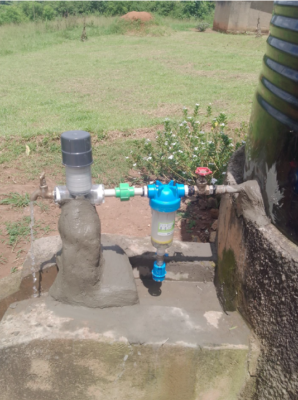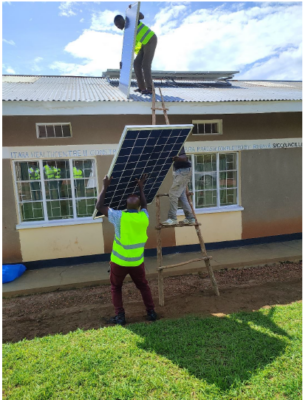In communities worldwide, many people cannot afford a visit to a hospital. And the global pandemic has continued to push the limits of local health centers—which underprivileged patients rely on for medical emergencies and routine health care. In Uganda, most rural health centers cannot provide full medical treatment to patients as they lack medical equipment, electricity, clean water, and other necessities.
Tumwebaze Antony first heard about the state of Itara Health Center, in the Rubaya sub-county, as he watched a local newscast during the pandemic-mandated lockdown. The broadcast narrated how a young lady became very ill one night, and her husband rushed her to Itara Health Center. The health center nurse came out of her residence with a kerosene lamp to attend to them. Due to a lack of electricity, the nurse could not provide the medical care required and referred them to another hospital some miles away.
That newscast prompted Antony to contact Mr. Akankwasa Tosa, who oversees Itara Health Center. Tosa mentioned the lack of electricity and clean water as the center’s most critical issues. Wanting to help, Antony submitted a proposal to EPICS IN IEEE, and the program funded US$5,955 to ensure a respected and safe healthcare center. A team from the IEEE Uganda section, students from the Rwantsinga High School, and other volunteers worked to install solar-powered electricity and a water treatment system at Itara Health Center.
The project implementation that took place in December 2022 provided the Itara health center with lights, power to run the vaccine refrigerator, technology equipment, and clean water that will help it to offer improved services to the people in the community. “Now, the health center has the ability to attend to patients at night, the security of the center has improved, and (the center) no longer has to worry about contaminated water, according to Antony. “We believe that this action has and will save numbers of lives and will be helpful to this community for a long period of time.”
“Now, the health center has the ability to attend to patients at night, the security of the center has improved, and (the center) no longer has to worry about contaminated water, according to Antony. “We believe that this action has and will save numbers of lives and will be helpful to this community for a long period of time.”
The solar-powered system is regulated by a charge controller to save the battery for needed times, such as nightfall or during poor weather conditions. This project will drastically improve every area within the community, from the center’s security to improving health standards. The IEEE volunteers team received practical training at the Nakawa Renewable Energy Training Center that prepared and equipped them with the knowledge and skills in safety, installation of solar systems, and maintenance. The training covered both theoretical education and hands-on practice. The IEEE team used the solar equipment in the workshop to practice the wiring and connection of different parts of the solar-powered system.
Fostering Collaboration in the Community
 To ensure all needs for the health center were met, the team partnered with two local organizations. Changing Lives Uganda, a non-profit organization missioned to promote healthy, wealthy, and democratic living through skilling, capacity building, and sensitization; and Davis & Shirtliff, the region’s leading supplier of water-related equipment. Changing Lives Uganda connected the IEEE team to local networks and attracted participants to the project’s activities. The regional networks will continue to help during monitoring and evaluation.
To ensure all needs for the health center were met, the team partnered with two local organizations. Changing Lives Uganda, a non-profit organization missioned to promote healthy, wealthy, and democratic living through skilling, capacity building, and sensitization; and Davis & Shirtliff, the region’s leading supplier of water-related equipment. Changing Lives Uganda connected the IEEE team to local networks and attracted participants to the project’s activities. The regional networks will continue to help during monitoring and evaluation.
This project promoted teamwork among the community members as most actively participated in the development, from the local leaders to the Itara village elders. They carried materials, prepared the site, witnessed installation work, and formed committees for security and maintenance. While the team did experience challenges, they were able to collaborate with the community and create solutions.
Students from Rwantsinga High School also helped the team while learning basic engineering skills and hands-on installation skills. The students saw first-hand how to use engineering knowledge and skills to develop simple solutions within their communities. The students learned valuable lessons in teamwork, proper resource management, leadership, and time management. Additionally, this project helped instill a love for engineering careers among the students as they got real-world experience and inspiration from young professionals and company technicians.
The transformation of the Itara Health Center has been shared on several WhatsApp groups and other platforms—attracting the attention of influential people and NGOs in the district. In response, they have offered services (both in kind and in cash) to the health center. The IEEE team members believe this will encourage more people to be involved in the center, adding years to the long-term viability of the Itara Health Center.
EPICS in IEEE is a donor-supported program through the IEEE Foundation. Thank you to all of our donors who make this project possible.

It was amazing to be part of the implementing, the community was so appreciative because it was more than light at the end of the tunnel.
They can now access clean water, medication at all hours.
Thank you EPICS for the grant